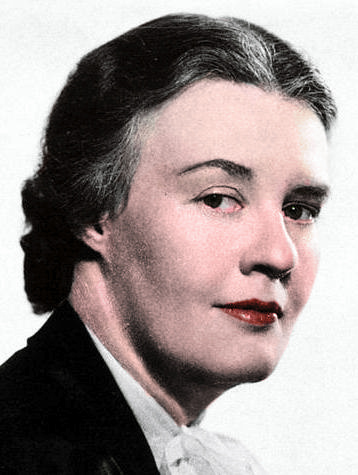Reading Eagle (May 12, 1941)

DOROTHY THOMPSON SAYS –
Why did Joseph Stalin decide to become Premier and, therefore, the head of the Soviet Union, which he has indirectly ruled so long? Why in this particular moment?
Internally, his assumption of authority as the titular head of the state changes nothing. Russia is governed by the Communist Party, and the Secretary-General of the Communist Party can dictate to any head of the state.
The reasons are external. As Secretary-General of the Party, even though that role makes him the actual dictator of the Soviet Union, Stalin cannot personally confer with the heads of other states. He can send Molotov to confer with Hitler, and he can receive the German Ambassador, Mr. Ribbentrop, but he himself cannot confer with Hitler on an equal basis. For even in these gangster-ridden times, there is such a thing as protocol.
Therefore, we may assume that Stalin has made himself the head of the government, as well as of the party that rules the government, in order to be able to personally meet and confer with Hitler. And I think we may anticipate a meeting between the Communist and the Nazi dictators, probably on the soil of another country, within the next two or three weeks.
Why in another two or three weeks? Why not tomorrow?
I think Stalin wants to wait that long to see what the United States is going to do and where the United States is going to do it.
Stalin’s dearest hope is that we will become embroiled with Japan in the Far East, and thus settle his own uneasiness on that score. This is the whole sense of the Russo-Japanese non-aggression pact, and some of us, including this columnist, who tried to put a better face on it at the time of its announcement, were following our wishes rather than our heads. Stalin will never trust Japan but he is prepared to adopt a benevolent neutrality in case of a Japanese Far Eastern war against the United States and Great Britain.
The extent to which the United States is involved will, however, determine his bargaining position with Hitler.
And Stalin needs to do some sharp bargaining.
The theory that Stalin was settling matters in the East in order to free his hands in the West is correct to this extent. He wanted to increase his bargaining power in the West. He is certainly not going to take on the German armies. He wants to make another deal and make as good as one as he can.
For Stalin has lost a lot of ground.
At the outset of this war, he hoped to make the Nazis pay for his benevolent neutrality, and to extract three advantages from the bargain: An improved position in the Baltic Sea, in the Black Sea and access to the Persian Gulf.
Undoubtedly, he had an understanding with Hitler about all three things. Hence his war against Finland and his occupation of the small independent Baltic States.
But with the occupation of Norway, and German economic domination of Sweden, Stalin’s gains in the Baltic are illusory. He is bottled up in the Baltic and Hitler has the key in his pocket.
It was Russia’s hope – and Germany’s original intention – to keep the war out of Balkans, at least until its last stage. Mussolini, who is anything but pro-Russian, prevented that by the attack on Greece.
Stalin hoped that the more expression of his dissatisfaction with Hitler’s occupation of Romania would have an effect. It had no effect. His stronger protestations over the occupation of Bulgaria were equally ignored. His open support of the Yugoslav cause was treated by Hitler as a bluff. Stalin did nothing but talk and Hitler took every position he wanted. So, by now, Stalin has had both the Baltic and the Black Sea shot out from under him. He is bottled up in both of them.
Only one envied position remains – the outlet of the Persian Gulf. Stalin will probably agree – because he has to – to a Hitler move in Turkey, Syria, Suez, Iraq. In return, he will probably demand the provinces of Erzurum and Kars, former Russian Imperial possessions, and domination of Iran to the Persian Gulf – and, incidentally, to the gates of India.
Probably he will get such a deal, although whether, in case of a Hitler victory his gains will be of any more use to him than the first ones, is a great question.
The inconsistencies and vacillations of our foreign policy toward Russia, China and Japan exist to plague us.
Stalin’s record shows that he will cheerfully collaborate with countries that put every Communist they can catch into jail. Like all the other democracies, we have chosen to snub the Soviet Union, whose larger political and national interests correspond with our own, while we have given excessive tolerance to the little Communist cockroaches that scuttle about in our own kitchens. Thus, we have actually been more tolerant toward the Comintern than towards the Soviet Union.
As for Japan, we are still waging a little civil war amongst ourselves, with 99% of the people on the side of China, and all paying taxes to send aid to China, while a tiny minority are still sending oil and iron ores to Japan in order to render our aid to China useless. We are thus having a little shooting war between ourselves in Asia.
We have managed to make enemies of both Russia and Japan, while rendering China impotent; a few interests collect transient profits and the attitude of the people, which is called in wartime morale, becomes thoroughly cynical. We also add fuel to the Axis propaganda that this is a plutocrat’s war.
And we justify our blunders by saying:
Democracies are that way.
If they had been that way in the 18th century, there wouldn’t have been any democracies to start with.